七年级下册英语Unit 11 How was your school trip? Section A(1a-2d) 课件+嵌入音频(共54张PPT)
文档属性
| 名称 | 七年级下册英语Unit 11 How was your school trip? Section A(1a-2d) 课件+嵌入音频(共54张PPT) | 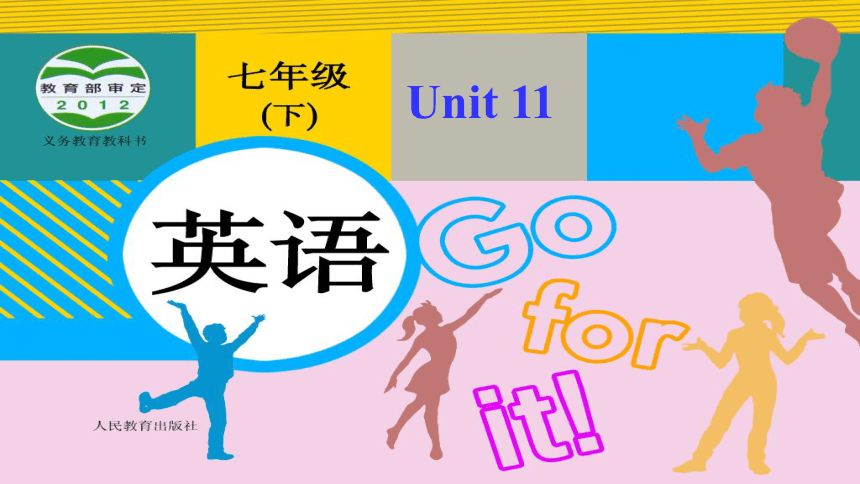 | |
| 格式 | zip | ||
| 文件大小 | 10.3MB | ||
| 资源类型 | 教案 | ||
| 版本资源 | 人教新目标(Go for it)版 | ||
| 科目 | 英语 | ||
| 更新时间 | 2021-06-06 09:28:04 | ||
图片预览

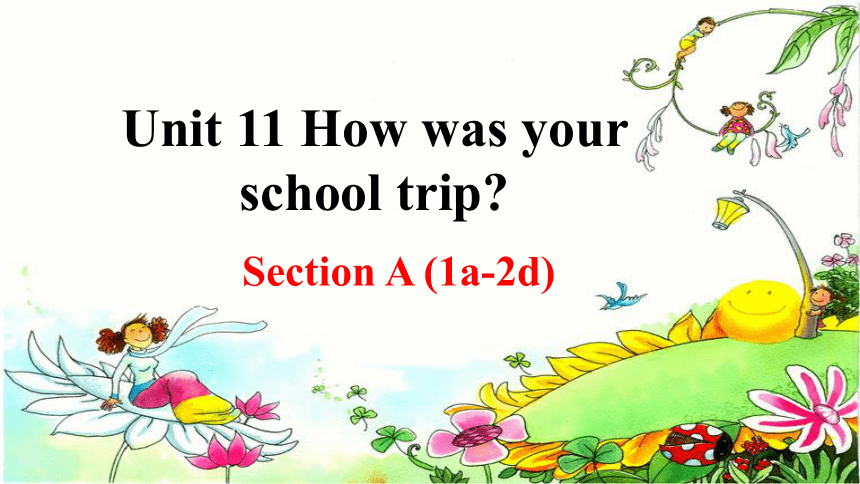
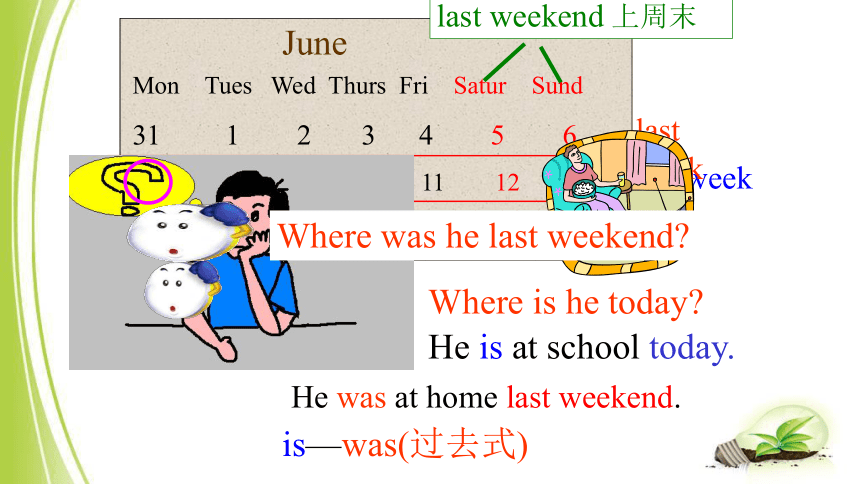
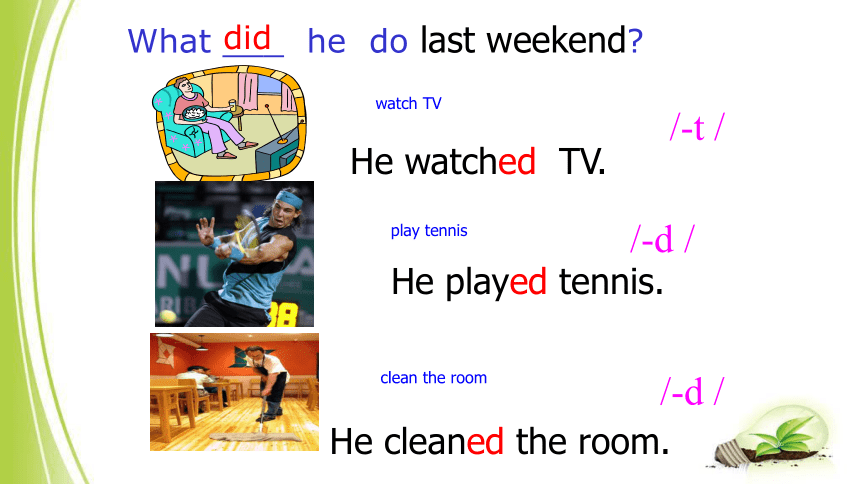
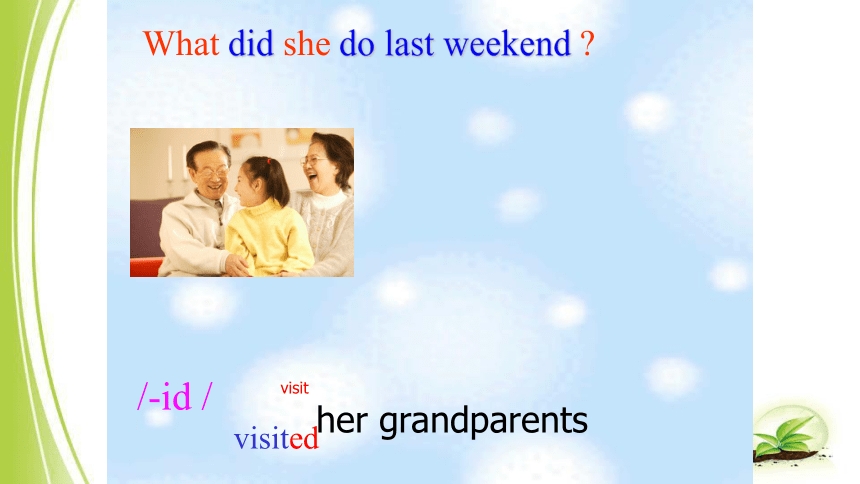
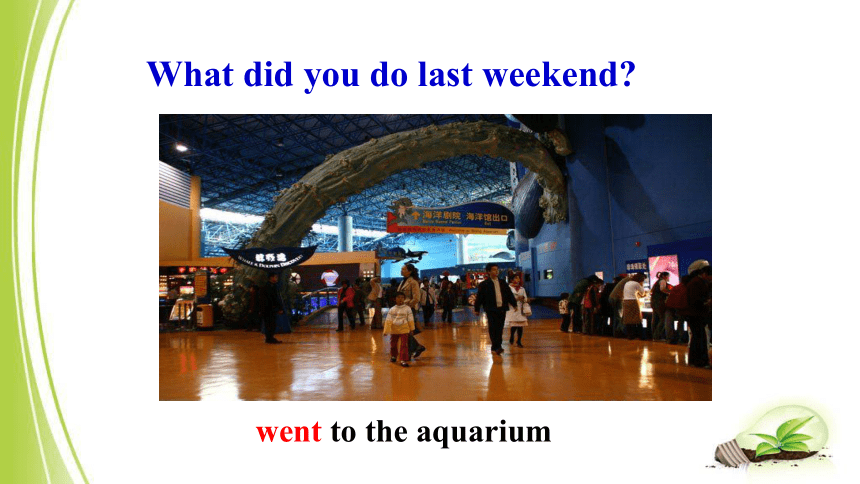
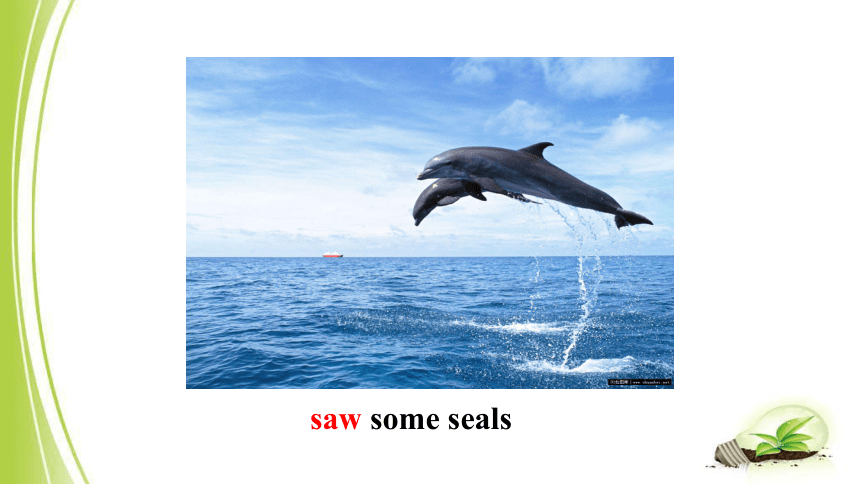
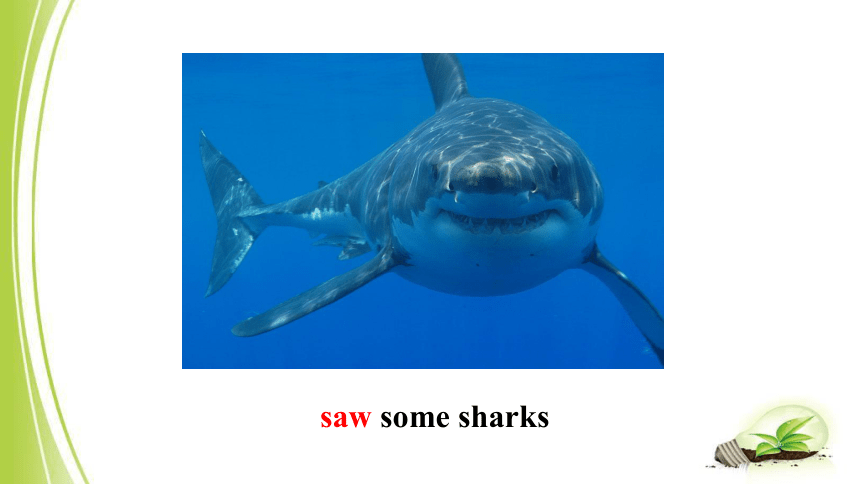
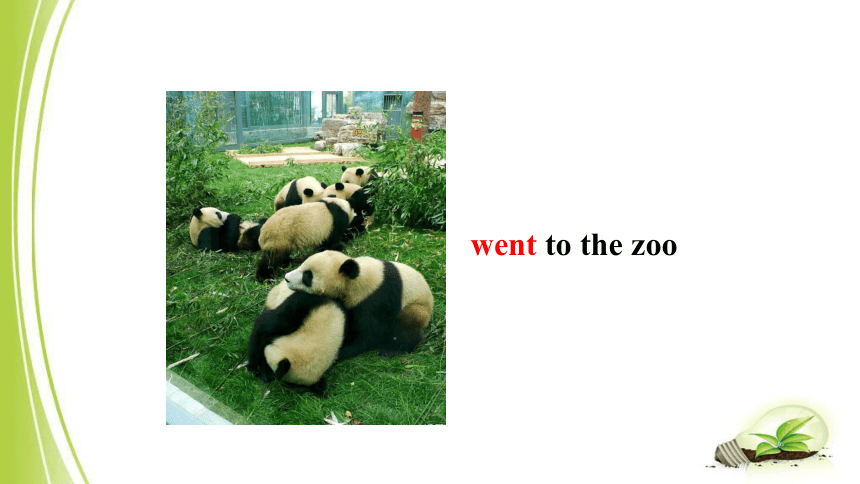
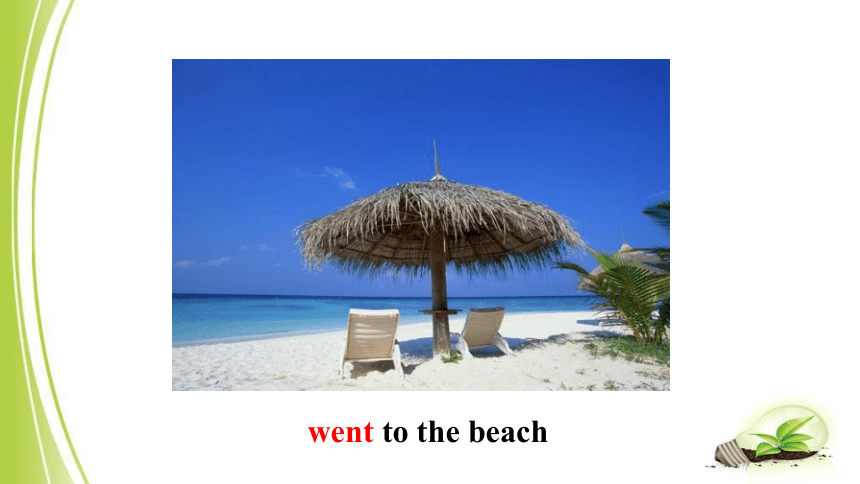
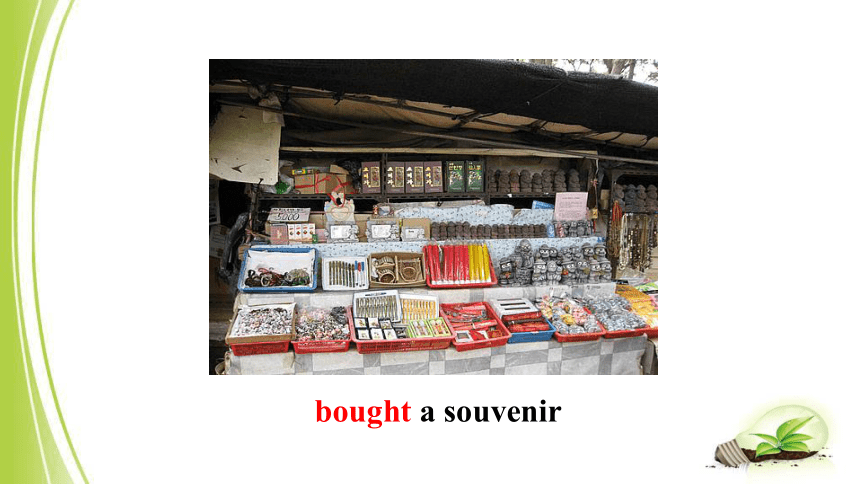
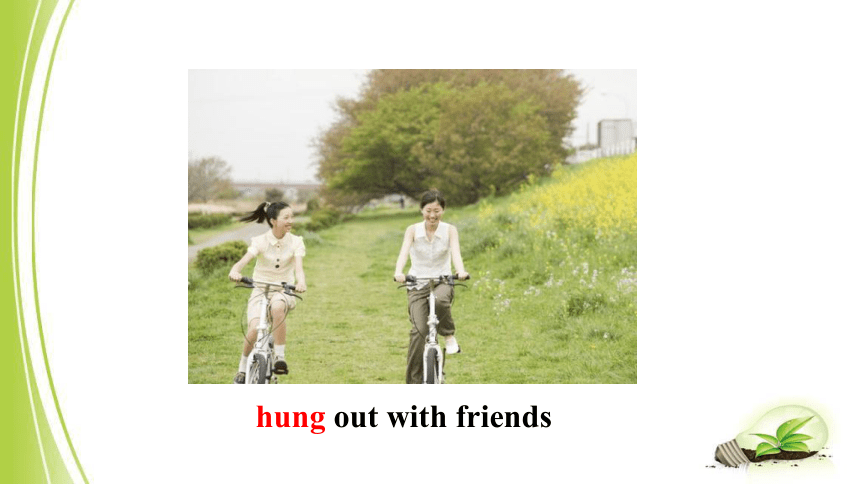
文档简介
(共54张PPT)
Unit
11
Section
A
(1a-2d)
Unit
11
How
was
your
school
trip?
June
Mon
Tues
Wed
Thurs
Fri
Satur
Sund
31
1
2
3
4
5
6
7
8
9
10
11
12
13
this
week
last
week
last
weekend
上周末
He
is
at
school
today.
He
was
at
home
last
weekend.
is—was(过去式)
Where
is
he
today?
Where
was
he
last
weekend?
He
cleaned
the
room.
He
played
tennis.
He
watched
TV.
play
tennis
watch
TV
clean
the
room
/-t
/
What
___
he
do
last
weekend?
did
/-d
/
/-d
/
visit
her
grandparents
visited
What
did
she
do
last
weekend
?
/-id
/
went
to
the
aquarium
What
did
you
do
last
weekend?
saw
some
seals
saw
some
sharks
went
to
the
zoo
went
to
the
beach
bought
a
souvenir
hung
out
with
friends
played
basketball
played
soccer
went
fishing
went
skateboarding
took
photos
ate
some
ice
cream
had
a
hamburger
Past过去
Present现在
ride
a
horse
feed
chickens
do
homework
go
to
a
countryside
pick
strawberries
milk
a
cow
rode
a
horse
fed
chickens
did
homework
went
to
a
countryside
picked
strawberries
milked
a
cow
1a
Match
the
phrases
with
the
pictures.
went
for
a
walk____
milked
a
cow____
rode
a
horse____
fed
chickens____
talked
with
a
farmer____
took
some
photos____
e
b
a
c
f
d
1b
Listen
and
circle
the
three
things
Carol
did
on
her
school
trip
in
1a.
went
for
a
walk
milked
a
cow
rode
a
horse
fed
chickens
talked
with
a
farmer
took
some
photos
1c
Ask
and
answer
questions
about
Carol’s
school
trip.
Did
Carol
take
any
photos?
Yes,
she
did.
A:
Did
Carol
take
any
photos?
B:
Yes,
she
did.
A:
Did
Carol
ride
a
horse?
B:
No,
she
didn’t.
A:
Did
Carol
talk
with
the
farmer?
B:
Yes,
she
did.
Ask
and
answer
questions
about
Carol’s
school
trip.
Speaking
Language
points
1.
went
for
a
walk
去散步
go
for
a
walk
相当于take
/
have
a
walk,此处
walk
作名词,意为“散步”。
例句:你想和我一起去散步吗?
Would
you
like
to
go
for
a
walk
with
me?
2.
milk
a
cow
给奶牛挤奶
milk
为动词,
意为“挤奶”。
milk
还可作名词,
意为“牛奶;乳液”,为不可数名词。
例句:农场工人用手挤牛奶。
Farm
workers
milked
cows
by
hand.
3.
—
Did
you
see
any
cows?
—
Yes,
I
did.
I
saw
quite
a
lot.
这是过去时态的一般疑问句,用于询问别人在过去某一时间是否做过某事。did
是do
的过去式,后接动词原形。
句型:Did+主语+动词原形+其他成分?
肯定回答:Yes,
主语+did.
否定回答:
No,
主语+didn’t.
4.
quite
a
lot
相当多
quite
作副词,意为“相当;非常”。
例句:我非常喜欢他。
I
like
him
quite
a
lot.
a
lot
后面不能直接跟名词,a
lot
of
相当于lots
of,其后可接可数名词复数或不可数名词。
What
did
they
do
last
Sunday?
He
took
some
photos
last
weekend.
What
did
he
do
last
weekend?
He
cleaned
the
room
yesterday.
What
did
he
do
yesterday?
He
played
computer
games
last
Sunday
afternoon.
What
did
he
do
last
Sunday
afternoon?
He
watched
TV
last
night.
What
did
he
do
last
night?
2a
Listen
and
check(√)
the
questions
you
hear.
_____
What
did
the
farmer
say?
_____
Did
you
grow
any
apples?
_____
What
did
you
see?
_____
Do
they
grow
apples?
_____
Did
you
learn
anything?
_____
Did
you
eat
them?
_____
Did
you
ask
him
any
questions?
_____
Were
they
good?
√
√
√
√
2b
Listen
again.
Circle
T
for
true
or
F
for
false.
1.
The
farmer
showed
Carol
around
the
farm.
T
F
2.
Carol
learned
a
lot
about
farming.
T
F
3.
The
farmers
grow
strawberries
from
December
to
June.
T
F
4.
The
farmers
don’t
grow
apples.
T
F
5.
Carol
picked
some
strawberries
and
took
them
home.
T
F
Bob:
So,
Carol,
was
the
farmer
nice?
Carol:
Yes,
he
was
very
friendly,
and
he
showed
us
around
the
farm.
Bob:
Really?
What
did
you
see?
Carol:
We
saw
a
lot
of
interesting
things
and
we
learned
a
lot
from
him
about
farming.
Bob:
That’s
great!
Did
you
ask
him
any
questions?
Carol:
Yes.
I
asked
him
if
the
farmers
grew
strawberries.
Tapescripts
showed
around
带领……参观……
①
learned
about
学习/了解……
②
farming
农事;耕作
Bob:
Do
they?
Carol:
Yes,
they
do.
They
grow
them
from
December
to
June.
Bob:
And
apples?
Do
they
grow
apples?
Carol:
Yes,
they
do.
They
pick
the
apples
around
September.
Bob:
Did
you
pick
any
strawberries?
Carol:
Yes,
we
did.
And
we
took
some
home,
too!
Bob:
Oh,
wow!
Were
they
good?
Carol:
They
were
delicious!
③
④
⑤
2c
Ask
and
answer
questions
about
Carol’s
visit
to
the
farm.
A:
What
did
Carol
do?
B:
She
picked
some
strawberries.
A:
How
was
your
school
trip?
B:
It
was
…
(boring/interesting/good/great…)
A:
What
did
you
do
on
the
school
trip?
B:
I
went
for
a
walk
with
my
classmates.
Practice
went
for
a
walk
milked
a
cow
rode
a
horse
took
some
photos
fed
chickens
talked
with
a
farmer
Peter:
Hi,
Eric.
How
was
your
trip
last
week?
Eric:
It
was
excellent.
I
visited
my
grandparents
in
the
countryside.
Peter:
Oh,
nice.
What
did
you
do?
Role-play
the
conversation.
2d
Eric:
I
went
fishing
every
day.
And
I
fed
the
chickens
with
my
grandpa.
It
was
so
much
fun.
Peter:
Sounds
good.
How
was
the
weather
there?
Eric:
It
was
great
and
the
air
was
so
clean.
I
watched
the
stars
at
night.
They
were
so
beautiful.
Peter:
Lucky
you.
Where
did
Eric
go
last
weekend?
He
went
to
the
countryside.
Why
did
he
go
there?
He
visited
his
grandparents.
What
did
he
do?
He
went
fishing
and
fed
the
chickens.
How
was
the
weather
there?
It
was
great
and
the
air
was
so
clean.
2d
Read
the
conversation
and
answer
the
questions.
What
did
he
do
at
night?
He
watched
the
stars.
How
did
Eric
feel
about
the
trip?
It
was
excellent.
Language
points
1.
I
visited
my
grandparents
in
the
countryside.
我去看望了乡下的爷爷奶奶。
a)
visit
表示“拜访,看望,参观”,后面可以是宾语可以是人,也可以是地点名词。e.g.
visit
my
teacher
=
call
on
my
teacher
visit
your
school
=
call
at
your
school
b)
in
the
countryside
在乡下
countryside在此处等同于couontry,都是“乡下,农村”之意,往往和冠词
“the”
搭配连用。e.g.
We
spent
a
pleasant
day
in
the
country.
2.
I
fed
the
chickens
with
my
grandpa.
“
feed
…
with
…词组表示“用……喂……”,此时等于“feed
…
on
…”
,短语中feed是及物动词,其后接人或动物名词作宾语。
e.g.
A
kid
fed
the
monkey
on/with
a
banana.
那个小孩用香蕉喂猴子。
短语feed
on
中的feed为不及物动词,意思是“以……为食,靠……为生”,其主语主要用来指动物,也可用于指婴儿,其宾语通常是食物或饲料名词,此时等同于live
on.
e.g.
Cattle
feed
mostly
on
grass.
牛以草为主食。
3.
Sounds
good.
听起来不错!
此句子省略了主语
it,
全句子应该是
it
sounds
good.
此处sound为系动词,表示“听起来……”其后加形容词。同样用法的单词还有feel,
taste,
smell,
look
等等,表示“摸,尝,闻,看……起来”。
e.g.:
This
coat
feels
soft.
这件上衣摸起来很软。
The
supper
smells
delicious.
晚饭闻起来很香。
1.
She
often
_____
(go)
to
the
park
on
weekends,
but
yesterday
she
____
(go)
to
the
zoo.
2.
Last
week,
she
_____
(have)
fun
on
a
farm.
3.
What
____
they
____
(do)
on
the
school
trip?
They
_____
(ride)
horses
and
________
(climb)
the
mountains.
Ⅰ.填入适当的词。
goes
went
had
did
do
rode
climbed
Exercises
4.
How
____
their
school
trip?
It
_____
interesting.
____
she
____
(go)
fishing?
Yes,
she
did.
5.
____
Li
Ming
_____
(pick)
any
strawberries?
No,
he
didn’t.
was
Did
go
Did
pick
was
6.
_____
she
_____
(sing)
a
song
last
night?
7.
--Were
there
any
people
in
the
room?
(作否定回答)
--______,
_______
_______nobody.
8.
--______(be)
they
at
work
this
morning?
--Yes.
They
______
(have)
a
meeting
together.
Did
sing
No
there
was
Were
had
9.
--______
Joe
______
(do)
well
in
the
long-distance
running?
--Yes,
he
_______.
10.
–Where
_____
Tina’s
family
____
(go)
last
summer?
--They
_______
(go)
to
New
York
for
their
vacation.
Did
do
did
did
go
went
1.
Did
you
talk
with
_____
farmers?
A.
some
B.
a
C.
any
2.
—What
did
Sam
do
on
the
farm?
—He
_____
chickens.
A.
feeds
B.
fed
C.
grows
单项选择。
3.
His
school
trip
was
_____.
He
had
a
good
time.
A.
great
B.
boring
C.
terrible
4.
—
_____
you
_____
to
the
zoo
last
Sunday?
—No,
I
didn’t.
A.
Do;
go
B.
Are;
going
C.
Did;
go
Let
me
________
________
________(带领你参观)the
city.
Carol
________
________
(去钓鱼)every
Sunday
last
summer.
My
trip
was
great
yesterday.
(对画线部分提问)
________
________
your
trip
yesterday?
show
you
around
went
fishing
How
was
按要求完成句子。
4.
They
went
to
the
park
last
Sunday.(对画线部分提问)
_______
_______
they
_______
last
Sunday?
5.
今天天气如此好,我想去外面打篮球。(汉译英)
The
weather
_______
_______
great
that
I
want
to
play
basketball
outside
today.
What
did
do
is
so
空白演示
单击输入您的封面副标题
Unit
11
Section
A
(1a-2d)
Unit
11
How
was
your
school
trip?
June
Mon
Tues
Wed
Thurs
Fri
Satur
Sund
31
1
2
3
4
5
6
7
8
9
10
11
12
13
this
week
last
week
last
weekend
上周末
He
is
at
school
today.
He
was
at
home
last
weekend.
is—was(过去式)
Where
is
he
today?
Where
was
he
last
weekend?
He
cleaned
the
room.
He
played
tennis.
He
watched
TV.
play
tennis
watch
TV
clean
the
room
/-t
/
What
___
he
do
last
weekend?
did
/-d
/
/-d
/
visit
her
grandparents
visited
What
did
she
do
last
weekend
?
/-id
/
went
to
the
aquarium
What
did
you
do
last
weekend?
saw
some
seals
saw
some
sharks
went
to
the
zoo
went
to
the
beach
bought
a
souvenir
hung
out
with
friends
played
basketball
played
soccer
went
fishing
went
skateboarding
took
photos
ate
some
ice
cream
had
a
hamburger
Past过去
Present现在
ride
a
horse
feed
chickens
do
homework
go
to
a
countryside
pick
strawberries
milk
a
cow
rode
a
horse
fed
chickens
did
homework
went
to
a
countryside
picked
strawberries
milked
a
cow
1a
Match
the
phrases
with
the
pictures.
went
for
a
walk____
milked
a
cow____
rode
a
horse____
fed
chickens____
talked
with
a
farmer____
took
some
photos____
e
b
a
c
f
d
1b
Listen
and
circle
the
three
things
Carol
did
on
her
school
trip
in
1a.
went
for
a
walk
milked
a
cow
rode
a
horse
fed
chickens
talked
with
a
farmer
took
some
photos
1c
Ask
and
answer
questions
about
Carol’s
school
trip.
Did
Carol
take
any
photos?
Yes,
she
did.
A:
Did
Carol
take
any
photos?
B:
Yes,
she
did.
A:
Did
Carol
ride
a
horse?
B:
No,
she
didn’t.
A:
Did
Carol
talk
with
the
farmer?
B:
Yes,
she
did.
Ask
and
answer
questions
about
Carol’s
school
trip.
Speaking
Language
points
1.
went
for
a
walk
去散步
go
for
a
walk
相当于take
/
have
a
walk,此处
walk
作名词,意为“散步”。
例句:你想和我一起去散步吗?
Would
you
like
to
go
for
a
walk
with
me?
2.
milk
a
cow
给奶牛挤奶
milk
为动词,
意为“挤奶”。
milk
还可作名词,
意为“牛奶;乳液”,为不可数名词。
例句:农场工人用手挤牛奶。
Farm
workers
milked
cows
by
hand.
3.
—
Did
you
see
any
cows?
—
Yes,
I
did.
I
saw
quite
a
lot.
这是过去时态的一般疑问句,用于询问别人在过去某一时间是否做过某事。did
是do
的过去式,后接动词原形。
句型:Did+主语+动词原形+其他成分?
肯定回答:Yes,
主语+did.
否定回答:
No,
主语+didn’t.
4.
quite
a
lot
相当多
quite
作副词,意为“相当;非常”。
例句:我非常喜欢他。
I
like
him
quite
a
lot.
a
lot
后面不能直接跟名词,a
lot
of
相当于lots
of,其后可接可数名词复数或不可数名词。
What
did
they
do
last
Sunday?
He
took
some
photos
last
weekend.
What
did
he
do
last
weekend?
He
cleaned
the
room
yesterday.
What
did
he
do
yesterday?
He
played
computer
games
last
Sunday
afternoon.
What
did
he
do
last
Sunday
afternoon?
He
watched
TV
last
night.
What
did
he
do
last
night?
2a
Listen
and
check(√)
the
questions
you
hear.
_____
What
did
the
farmer
say?
_____
Did
you
grow
any
apples?
_____
What
did
you
see?
_____
Do
they
grow
apples?
_____
Did
you
learn
anything?
_____
Did
you
eat
them?
_____
Did
you
ask
him
any
questions?
_____
Were
they
good?
√
√
√
√
2b
Listen
again.
Circle
T
for
true
or
F
for
false.
1.
The
farmer
showed
Carol
around
the
farm.
T
F
2.
Carol
learned
a
lot
about
farming.
T
F
3.
The
farmers
grow
strawberries
from
December
to
June.
T
F
4.
The
farmers
don’t
grow
apples.
T
F
5.
Carol
picked
some
strawberries
and
took
them
home.
T
F
Bob:
So,
Carol,
was
the
farmer
nice?
Carol:
Yes,
he
was
very
friendly,
and
he
showed
us
around
the
farm.
Bob:
Really?
What
did
you
see?
Carol:
We
saw
a
lot
of
interesting
things
and
we
learned
a
lot
from
him
about
farming.
Bob:
That’s
great!
Did
you
ask
him
any
questions?
Carol:
Yes.
I
asked
him
if
the
farmers
grew
strawberries.
Tapescripts
showed
around
带领……参观……
①
learned
about
学习/了解……
②
farming
农事;耕作
Bob:
Do
they?
Carol:
Yes,
they
do.
They
grow
them
from
December
to
June.
Bob:
And
apples?
Do
they
grow
apples?
Carol:
Yes,
they
do.
They
pick
the
apples
around
September.
Bob:
Did
you
pick
any
strawberries?
Carol:
Yes,
we
did.
And
we
took
some
home,
too!
Bob:
Oh,
wow!
Were
they
good?
Carol:
They
were
delicious!
③
④
⑤
2c
Ask
and
answer
questions
about
Carol’s
visit
to
the
farm.
A:
What
did
Carol
do?
B:
She
picked
some
strawberries.
A:
How
was
your
school
trip?
B:
It
was
…
(boring/interesting/good/great…)
A:
What
did
you
do
on
the
school
trip?
B:
I
went
for
a
walk
with
my
classmates.
Practice
went
for
a
walk
milked
a
cow
rode
a
horse
took
some
photos
fed
chickens
talked
with
a
farmer
Peter:
Hi,
Eric.
How
was
your
trip
last
week?
Eric:
It
was
excellent.
I
visited
my
grandparents
in
the
countryside.
Peter:
Oh,
nice.
What
did
you
do?
Role-play
the
conversation.
2d
Eric:
I
went
fishing
every
day.
And
I
fed
the
chickens
with
my
grandpa.
It
was
so
much
fun.
Peter:
Sounds
good.
How
was
the
weather
there?
Eric:
It
was
great
and
the
air
was
so
clean.
I
watched
the
stars
at
night.
They
were
so
beautiful.
Peter:
Lucky
you.
Where
did
Eric
go
last
weekend?
He
went
to
the
countryside.
Why
did
he
go
there?
He
visited
his
grandparents.
What
did
he
do?
He
went
fishing
and
fed
the
chickens.
How
was
the
weather
there?
It
was
great
and
the
air
was
so
clean.
2d
Read
the
conversation
and
answer
the
questions.
What
did
he
do
at
night?
He
watched
the
stars.
How
did
Eric
feel
about
the
trip?
It
was
excellent.
Language
points
1.
I
visited
my
grandparents
in
the
countryside.
我去看望了乡下的爷爷奶奶。
a)
visit
表示“拜访,看望,参观”,后面可以是宾语可以是人,也可以是地点名词。e.g.
visit
my
teacher
=
call
on
my
teacher
visit
your
school
=
call
at
your
school
b)
in
the
countryside
在乡下
countryside在此处等同于couontry,都是“乡下,农村”之意,往往和冠词
“the”
搭配连用。e.g.
We
spent
a
pleasant
day
in
the
country.
2.
I
fed
the
chickens
with
my
grandpa.
“
feed
…
with
…词组表示“用……喂……”,此时等于“feed
…
on
…”
,短语中feed是及物动词,其后接人或动物名词作宾语。
e.g.
A
kid
fed
the
monkey
on/with
a
banana.
那个小孩用香蕉喂猴子。
短语feed
on
中的feed为不及物动词,意思是“以……为食,靠……为生”,其主语主要用来指动物,也可用于指婴儿,其宾语通常是食物或饲料名词,此时等同于live
on.
e.g.
Cattle
feed
mostly
on
grass.
牛以草为主食。
3.
Sounds
good.
听起来不错!
此句子省略了主语
it,
全句子应该是
it
sounds
good.
此处sound为系动词,表示“听起来……”其后加形容词。同样用法的单词还有feel,
taste,
smell,
look
等等,表示“摸,尝,闻,看……起来”。
e.g.:
This
coat
feels
soft.
这件上衣摸起来很软。
The
supper
smells
delicious.
晚饭闻起来很香。
1.
She
often
_____
(go)
to
the
park
on
weekends,
but
yesterday
she
____
(go)
to
the
zoo.
2.
Last
week,
she
_____
(have)
fun
on
a
farm.
3.
What
____
they
____
(do)
on
the
school
trip?
They
_____
(ride)
horses
and
________
(climb)
the
mountains.
Ⅰ.填入适当的词。
goes
went
had
did
do
rode
climbed
Exercises
4.
How
____
their
school
trip?
It
_____
interesting.
____
she
____
(go)
fishing?
Yes,
she
did.
5.
____
Li
Ming
_____
(pick)
any
strawberries?
No,
he
didn’t.
was
Did
go
Did
pick
was
6.
_____
she
_____
(sing)
a
song
last
night?
7.
--Were
there
any
people
in
the
room?
(作否定回答)
--______,
_______
_______nobody.
8.
--______(be)
they
at
work
this
morning?
--Yes.
They
______
(have)
a
meeting
together.
Did
sing
No
there
was
Were
had
9.
--______
Joe
______
(do)
well
in
the
long-distance
running?
--Yes,
he
_______.
10.
–Where
_____
Tina’s
family
____
(go)
last
summer?
--They
_______
(go)
to
New
York
for
their
vacation.
Did
do
did
did
go
went
1.
Did
you
talk
with
_____
farmers?
A.
some
B.
a
C.
any
2.
—What
did
Sam
do
on
the
farm?
—He
_____
chickens.
A.
feeds
B.
fed
C.
grows
单项选择。
3.
His
school
trip
was
_____.
He
had
a
good
time.
A.
great
B.
boring
C.
terrible
4.
—
_____
you
_____
to
the
zoo
last
Sunday?
—No,
I
didn’t.
A.
Do;
go
B.
Are;
going
C.
Did;
go
Let
me
________
________
________(带领你参观)the
city.
Carol
________
________
(去钓鱼)every
Sunday
last
summer.
My
trip
was
great
yesterday.
(对画线部分提问)
________
________
your
trip
yesterday?
show
you
around
went
fishing
How
was
按要求完成句子。
4.
They
went
to
the
park
last
Sunday.(对画线部分提问)
_______
_______
they
_______
last
Sunday?
5.
今天天气如此好,我想去外面打篮球。(汉译英)
The
weather
_______
_______
great
that
I
want
to
play
basketball
outside
today.
What
did
do
is
so
空白演示
单击输入您的封面副标题
同课章节目录
- Unit 1 Can you play the guitar?
- Section A
- Section B
- Unit 2 What time do you go to school?
- Section A
- Section B
- Unit 3 How do you get to school?
- Section A
- Section B
- Unit 4 Don't eat in class.
- Section A
- Section B
- Unit 5 Why do you like pandas?
- Section A
- Section B
- Unit 6 I'm watching TV.
- Section A
- Section B
- Review of Units 1-6
- Unit 7 It's raining!
- Section A
- Section B
- Unit 8 Is there a post office near here?
- Section A
- Section B
- Unit 9 What does he look like?
- Section A
- Section B
- Unit 10 I'd like some noodles.
- Section A
- Section B
- Unit 11 How was your school trip?
- Section A
- Section B
- Unit 12 What did you do last weekend?
- Section A
- Section B
